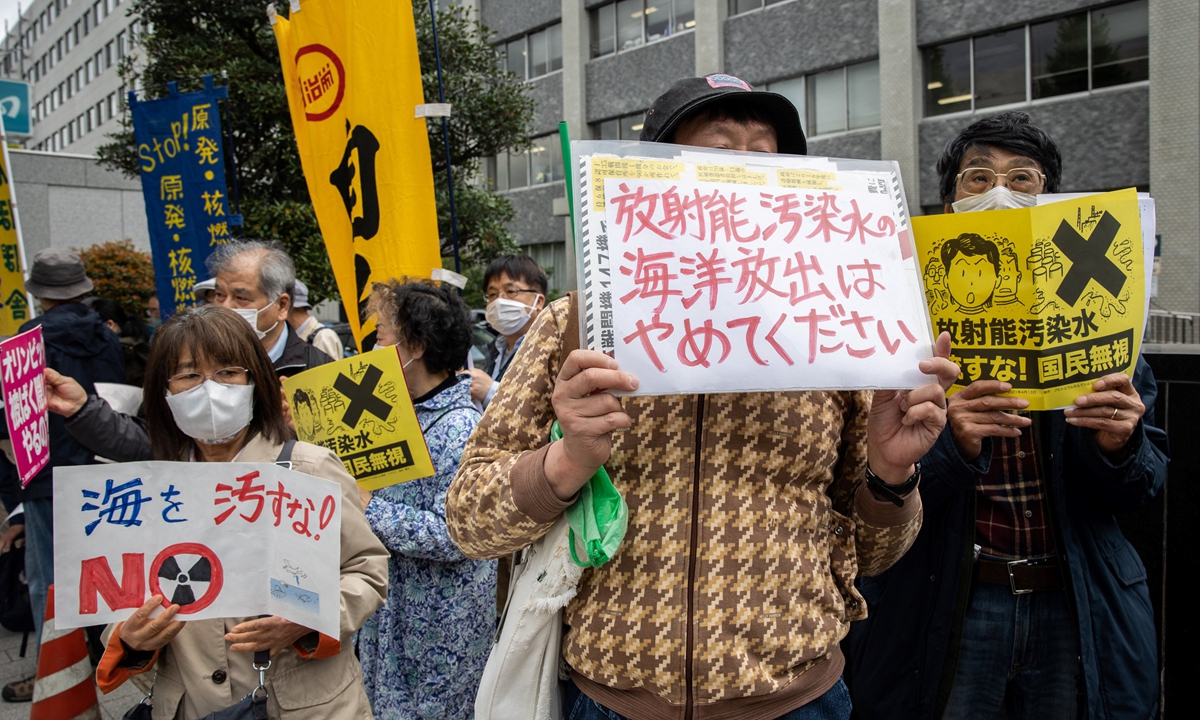
Demonstrators hold slogans during a protest against the Japanese government's plan to release more than a million tonnes of treated water from the stricken Fukushima nuclear plant into the ocean, outside the prime minister's office in Tokyo on April 13, 2021. Photo: AFP
The Japanese government on Wednesday removed tritium mascot-related images and videos from the website only one day after its release due to the different voices over this issue spread widely around the world. Japan said it would adjust related design of this mascot.
The topic also triggered wide discussion among Chinese netizens, with over 140 million reads on Sina Weibo, Chinese twitter like social media. Many netizens expressed their disagreement over Japanese government's act.
"Shameful! It's unimaginable that they made a mascot on this serious issue…" one netizen wrote.
The Japanese government's indescribable and confusing move to use a mascot of tritium to propagandize the safety of radioactive nuclear wastewater, which it decided to dump into the Pacific Ocean, has triggered public criticism on social media across the world.
In order to publicize the safety of the radioactive element tritium in the treated wastewater from the Fukushima Daiichi nuclear power plant, Japan's Reconstruction Agency, the principal agency tasked with the reconstruction process following the Great East Japan Earthquake on March 11, 2011, produced and sent out a leaflet on Tuesday, in which radioactive tritium was personified as an adorable mascot, Japanese newspaper Tokyo Shinbun reported.
The agency representative explained that a mascot was used to describe the tritium because it appears approachable and understandable.
The move immediately came under fire on social media by Japanese netizens with many questioning on Twitter whether the government tried to fool its nationals with a mascot.
A Japanese netizen named kaz_fukuyama asked that if the nuclear wastewater is safe, why was it kept in the tanks?
Another Japanese netizen named Narodovlastiye pointed out that the move would lead people to believe that the treated wastewater contained only radioactive tritium, however, other radioactive isotopes such as strontium-90 also exist.
Chinese netizens ridiculed the way the Japanese government profiled the radioactive tritium, saying it is like conducting a funeral in the way that a wedding is held, a superstitious practice in China's rural areas that hopes that the joyous occasion would ward off imminent death.
A Chinese netizen named RRRainGGGod on Sina Weibo satirized that "the mascot is so adorable, why not hold a swimming competition in the nuclear wastewater; those who can survive the competition can drink free harmless nuke wastewater for the rest of their lives!"
Another netizen said the reason for his dislike of Japanese ACG culture is that it turns a serious topic into entertainment while keeping silent the issues that really affect the world and mankind.
Both the International Atomic Energy Agency (IAEA) and Tokyo Electric Power Company (TEPCO) previously admitted that tritium cannot be removed from the wastewater despite being treated, even though most other radioactive elements in the nuke wastewater can be eliminated.
TEPCO previously stated that tritium will be diluted to one-fortieth of the Japanese national standard after being treated, which was supported by the Japanese Deputy Prime Minister and Finance Minister Taro Aso, who claimed that it doesn't matter if one drinks the treated nuke wastewater.
However, such acclamations failed to convince internet users with many Japanese netizens suggesting he drink it himself first.
A research project in 2012 by Helmholtz Center for Ocean Research Kiel (GEOMAR), a marine research institute in Germany, showed that it would only take 57 days for radioactive materials from the nuclear wastewater to spread to most of the Pacific Ocean, three years to reach the US and Canada, and 10 years to spread worldwide, with their impacts affecting the marine environment, fishery resources, food safety and human health.
A netizen on Twitter commented that "there is no safe or threshold level below which increased radiation does not increase the risk of cancer. Even if the dirty water from Fukushima is diluted by the Pacific Ocean, it will pose a danger for countries around the Pacific basin."




